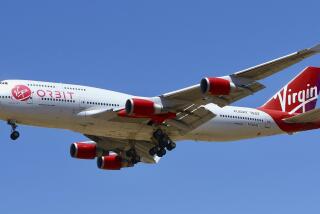Loral Urged to Sell Its Stake in Globalstar
- Share via
NEW YORK — Loral Communications Ltd. shareholders are calling for the company to sell its 45% stake in Globalstar Telecommunications Ltd., whose stock has tumbled this year.
Globalstar is the only satellite-phone company that hasn’t filed for bankruptcy protection or shut down.
The firm’s shares have dropped 73% since January after Iridium collapsed and investors began to wonder whether a market for satellite phones exists. Investors are pushing Loral, the second-largest satellite operator in the U.S., to stop spending money on Globalstar and concentrate on Internet and data services.
Globalstar’s plan was to sell its service in remote areas of the world where cellular didn’t reach. Like ICO Global Communications Ltd., now being reorganized, and Iridium, which folded March 17, Globalstar has been struggling to lure customers since starting up in October.
“Loral had better start divorcing itself from Globalstar before it takes down the whole operation,” said Adam Comora, an analyst at Entrust Capital Inc., which has sold short Globalstar shares, a transaction in which Entrust will profit if Globalstar stock declines.
“Globalstar needs $600 million a year to operate, and revenue doesn’t look like it will come near that number,” Comora said.
Iridium, which was founded by Motorola Inc., shut after failing to attract a bid for its assets. Analysts placed much of the blame for the bankruptcy on the company’s bulky phones, which cost as much as $3,000 and didn’t work well in buildings and cars.
Five analysts cut their ratings on Globalstar after it failed to deliver expected subscriber numbers. Globalstar shares’ drop hurt Loral stock, which has fallen 62% this year.
John Dixon, chief investment officer at Taras Funds Ltd., recently sold his stake in New York-based Globalstar as well as Loral, saying Globalstar was beginning to show early signs of failure similar to Iridium’s.
“While Globalstar management has repeatedly claimed Iridium to be irrelevant, they have seemingly failed to glean valuable lessons from Iridium’s demise,” Dixon said. “Handset prices remain far too high, minutes-of-use estimates are too high, as are market-size estimates.”
Globalstar currently is worth about $5.25 billion, with about $2.75 billion in equity and $2.5 billion in debt, said Tejas Securities Group analyst Blake Carter, who has a “sell” rating on the company. Globalstar has enough money to sustain it only through the fourth quarter and will need to sign up at least 500,000 subscribers by year-end to stay in business, he said.
“They’re going to have to add subscribers to the system or raise more money or file for bankruptcy. That’s the reality,” Carter said.
Selling the Globalstar stake would allow New York-based Loral to concentrate on its Cyberstar unit, which will begin providing satellite-based Internet and data services next year, said Merrill Lynch analyst Bill Pitkin, who has a “long-term neutral” rating on Globalstar stock.
Globalstar, which began service in 11 countries on Jan. 1, has repeatedly revised forecasts and now expects to have 557,000 phones in service by year-end. The company had shipped about 40,000 phones by the end of 1999. It charges about $1,500 for phones and about $1.50 a minute for service.
The company plans to report first-quarter subscriber figures this week, a spokesman said.
The decision to sell Globalstar ultimately rests with Chief Executive Bernard Schwartz, who says he’s convinced that Globalstar will work. The 74-year-old chairman of both Globalstar and Loral is known for being a timely investor who made millions of dollars in 1996 from the sale of Loral’s defense and electronics unit to Lockheed Martin Corp. for about $9 billion.
Schwartz declined to comment.
Schwartz, who took control of Loral in 1972, started Globalstar with partner and handset maker Qualcomm Inc. in March 1994. Delays in equipment testing and the loss of 12 satellites in a failed rocket launch in September 1998 delayed the start of Globalstar’s service by about a year.
Even if Schwartz does cut costs, Globalstar’s decline this year has shut Loral out of the equity market, investors said.
Globalstar shares on Wednesday fell $1.44 to close at $12 on Nasdaq. Loral fell 38 cents to close at $9.13 on the New York Stock Exchange.





